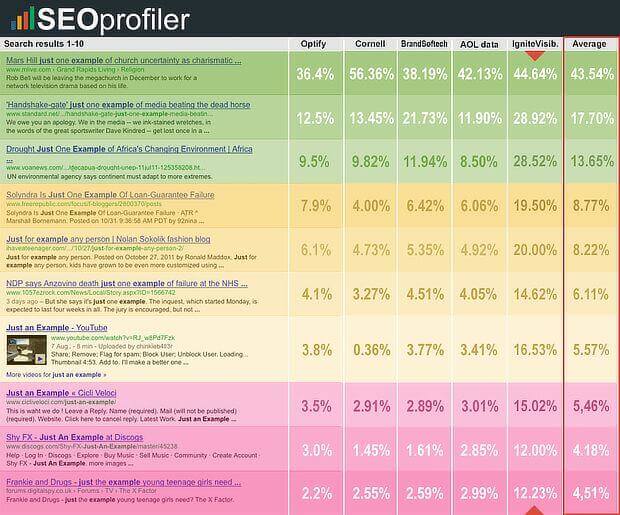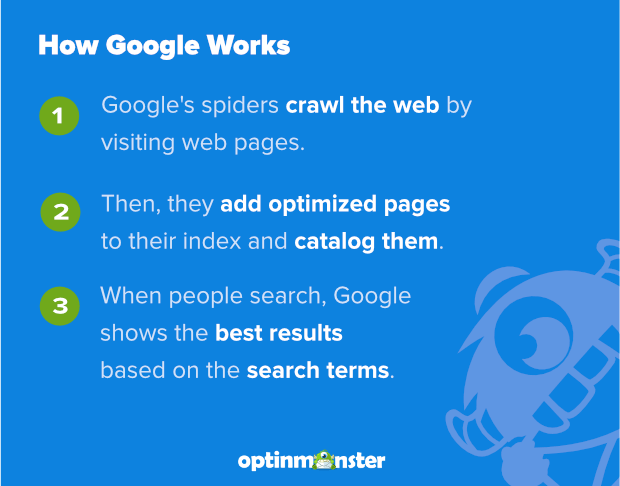To use keywords for SEO, strategically place them in titles, headings, and throughout your content. Ensure they align with your audience’s search intentions.
Mastering the art of keyword usage is crucial for enhancing your website’s visibility and attracting the right audience. It’s not just about cramming keywords into your content but integrating them in a way that feels natural and provides value. By understanding your audience’s needs and the keywords they use to find solutions online, you can craft content that ranks higher in search engine results pages (SERPs).
Effective keyword usage is a blend of art and science, requiring research, strategy, and a touch of creativity. This approach not only boosts your SEO efforts but also improves the user experience, making your website a go-to resource for valuable information. Remember, the goal is to engage and inform your audience, not just to rank well.

Credit: optinmonster.com
The Essence Of Keywords In Seo
The Essence of Keywords in SEO lies in understanding how people search for information online. Keywords help bridge the gap between user queries and relevant content. By carefully selecting and using keywords, websites can attract more visitors. This section dives into the critical role keywords play in SEO.
Keywords As Search Engine Cornerstones
Search engines like Google use keywords to understand and index web pages. This makes keywords the foundation of any successful SEO strategy. Consider the following points:
- Keywords guide search engines to a website’s content.
- They help categorize and rank web pages.
- Choosing the right keywords can boost a website’s visibility.
Using tools like Google Keyword Planner or SEMrush can aid in finding effective keywords. Aim for a mix of high-volume and long-tail keywords. High-volume keywords have many searches. Long-tail keywords are more specific but less competitive.
The Impact Of Keywords On Rankings
Keywords significantly influence a website’s ranking on search engine results pages (SERPs). Their strategic use can lead to higher rankings. Observe the following:
- Pages with well-optimized keywords rank better.
- Keywords in titles, headings, and meta descriptions are crucial.
- Quality content with naturally integrated keywords performs best.
Avoid keyword stuffing, as it can harm rankings. Instead, focus on creating valuable content that naturally incorporates keywords. This approach improves user experience and search engine rankings.
Keyword Research Fundamentals
Keyword research is the cornerstone of SEO success. It helps you understand what your audience is searching for online. This knowledge allows you to create content that matches their needs. Let’s dive into the essentials of keyword research.
Identifying Your Target Audience
To find the right keywords, you must first know your audience. Think about their interests, problems, and questions. This will guide you to the terms they use in search engines.
- Demographics: Age, location, gender
- Interests: Hobbies, values, lifestyle
- Problems: Common challenges, needs
Tools For Keyword Discovery
Several tools can aid in finding keywords. These tools provide insights into search volumes, trends, and competition.
| Tool | Features |
|---|---|
| Google Keyword Planner | Search volume data, cost estimates |
| Ahrefs | Keyword difficulty, search volume |
| SEMrush | Keyword magic tool, keyword variations |
| Moz Keyword Explorer | SERP analysis, organic CTR |
Types Of Keywords
Mastering the ‘Types of Keywords’ is essential in SEO. Keywords help your content rank higher on search engines. They guide users to your site. Different keywords serve various purposes. Learn to use the right type for your strategy.
Short-tail Vs Long-tail Keywords
| Short-Tail Keywords | Long-Tail Keywords |
|---|---|
| 1-3 words long | Over 3 words, often a phrase |
| Broader search intent | Specific search intent |
| High search volume | Lower search volume |
| More competition | Less competition |
| Example: “shoes” | Example: “men’s running shoes size 11” |
Short-tail keywords are broad. They attract more traffic. Yet, they are highly competitive. Long-tail keywords are specific. They target niche audiences. They often lead to higher conversion rates.
Transactional Vs Informational Keywords
- Transactional Keywords:
- Signal purchase intent
- Include terms like ‘buy’, ‘deal’, ‘discount’
- Users ready to transact
- Informational Keywords:
- Seek information or answers
- Start with ‘how to’, ‘what is’
- Users in the research phase
Transactional keywords lead to sales. They are for users deciding to buy. Informational keywords provide knowledge. They are for users looking for information.

Credit: optinmonster.com
Analyzing Keyword Metrics
Mastering SEO starts with understanding keyword metrics. This knowledge shapes a strategy. Let’s dive in.
Search Volume And Relevance
Search volume shows how many people search for a keyword. High volume means more potential visitors. But it’s not just about numbers. Keywords must be relevant to your content. This ensures you attract the right audience. Use tools like Google Keyword Planner for data. Look for a balance between volume and relevance.
Keyword Difficulty And Competition
Keyword difficulty indicates ranking difficulty. Competition reveals who else targets the keyword. Aim for low-difficulty, high-volume keywords. Check competitors’ keywords with tools like SEMrush or Ahrefs. This helps find gaps in the market.
Consider this table for a visual aid:
| Keyword | Volume | Difficulty | Competition |
|---|---|---|---|
| Best running shoes | 12,000 | Medium | High |
| Running shoes for flat feet | 3,000 | Low | Medium |
Use this data to guide your keyword choice. Target keywords within your site’s reach. This approach helps you rank better and faster.
Strategies For Keyword Optimization
Mastering keyword optimization boosts your content’s SEO success. It’s about choosing the right words. This guide covers top strategies for keyword optimization.
Balancing Keyword Density
Keyword density is the number of times a keyword appears. It’s a percentage of the overall word count. Ideal density makes content relevant without overstuffing. Here’s how:
- Target a keyword density of 1-2%.
- Use keywords in titles, headers, and the opening paragraph.
- Spread them evenly throughout the text.
- Write naturally; let keywords fit smoothly.
The Role Of Lsi Keywords
LSI keywords are related terms. They help search engines understand content better. Use them to enhance topic relevance. See the table below:
| Primary Keyword | LSI Keywords |
|---|---|
| Baking bread | Yeast, whole grain, gluten-free |
| Gardening tips | Soil quality, plant care, watering schedule |
Include LSI keywords naturally. They should enrich your content.
On-page Seo Best Practices
On-Page SEO Best Practices focus on optimizing web pages. This helps search engines understand and rank content. Let’s dive into key practices.
Optimizing Title Tags And Meta Descriptions
Title tags and meta descriptions are crucial for SEO. They tell search engines and users what your page is about. Make sure to:
- Include keywords in your title tags. Place them at the beginning.
- Keep title tags under 60 characters.
- Make meta descriptions enticing. They should encourage clicks. Keep them under 160 characters.
Keyword Integration In Content
Keywords should naturally blend into your content. Follow these tips:
- Use keywords early in the content. Ideally, in the first 100 words.
- Vary keyword forms. Use synonyms and related terms.
- Don’t overuse keywords. Aim for a natural, readable flow.
- Include keywords in headings and subheadings.
Technical Seo And Keyword Placement
Mastering Technical SEO and Keyword Placement boosts your website’s search rankings. Precise keyword use in technical areas matters. Let’s dive into how to optimize URLs and headings.
Url Structure And Keywords
URLs are a map for both users and search engines. They should be clean, simple, and keyword-rich. Here’s how:
- Keep URLs short: Short URLs rank better.
- Use hyphens, not underscores: Hyphens separate words effectively.
- Include keywords: Add relevant keywords near the beginning.
For example, use Best Coffee Machines instead of Product Item.
Heading Tags And Keywords
Heading tags organize content and guide readers. Search engines use them too. Follow these tips:
- Use one H1 tag: This is your main topic. Include the primary keyword.
- Employ H2s for subtopics: Use related keywords here.
- Be descriptive with H3s: They should be clear and relevant.
An H1 might be Top Espresso Machines
Affordable Espresso Machines
Features to Consider
Tracking Your Keyword Performance
Understanding how your keywords perform is vital for SEO success. It shows what works and what needs change. Let’s dive into tracking keyword performance.
Setting Up Effective Kpis
Key Performance Indicators (KPIs) help measure SEO success. Choose KPIs that align with your goals. Common KPIs include rankings, organic traffic, and conversions. Rankings check your keyword positions. Organic traffic measures visitors from search engines. Conversions track actions taken on your site.
- Click-Through Rate (CTR): Measures the percentage of clicks per impression.
- Bounce Rate: The rate at which visitors leave without interaction.
- Time on Page: Average duration visitors spend on your content.
Using Analytics To Refine Strategy
Google Analytics offers insights into keyword performance. Use it to track user behavior and traffic sources. Check the ‘Acquisition’ section to see keyword-driven traffic. The ‘Behavior’ section shows how users interact with your content.
| Analytics Feature | Use |
|---|---|
| Acquisition Reports | View traffic from keywords. |
| Behavior Flow | Analyze visitor paths. |
| Conversion Goals | Track completed actions. |
Use data to tweak your SEO strategy. Find high-performing keywords to focus on. Identify underperforming ones to optimize or replace.
Avoiding Keyword Stuffing And Penalties
Avoiding Keyword Stuffing and Penalties is crucial in SEO. Keywords help your website rank higher on search engines. Yet, using them too much leads to penalties. It is like adding too much salt to a dish. Just the right amount can enhance the flavor, but too much ruins it. The same goes for keywords in your content. Let’s look at how to avoid overdoing it.
Recognizing Over-optimization
Recognizing over-optimization is the first step in avoiding penalties. It involves using keywords too often or out of context. This makes your content hard to read. Search engines see this and may flag your site. They prefer natural, user-friendly content. Here’s what to watch for:
- Keyword stuffing: Repeating the same keywords in a forced way.
- Irrelevant keywords: Using popular keywords that don’t match your content.
- Hidden text: Hiding keywords in the background, making them invisible to users.
Maintaining Organic Content Flow
To maintain a organic content flow, write for humans first. Imagine talking to a friend. Your conversation flows and feels natural. Apply this to your writing. Here are some tips:
- Use synonyms and related phrases.
- Place keywords where they make sense.
- Read your content out loud. Does it sound natural?
Remember, the goal is to keep readers engaged. Your content should answer their questions. It should solve their problems. If you do this well, search engines will notice. They reward content that users find helpful.

Credit: www.themarketinggarage.ca
The Future Of Keywords In Seo
The Future of Keywords in SEO is evolving. Search engines become smarter. They understand what users want. The way we use keywords is changing. Let’s explore how to stay ahead.
Semantic Search And User Intent
Keywords are not just words. They are concepts. They have meaning. Semantic search is about this meaning. It connects search queries with user intent. This means:
- Focus on topics, not just single keywords.
- Understand what users really want to find.
- Create content that answers their questions.
Use tools for keyword research. Look for related phrases. Think about synonyms. Group them in clusters. This approach helps search engines connect your content with the right users.
Adapting To Algorithm Updates
Search engines update often. They try to give better answers. We must adapt to these changes. This includes:
- Staying informed about updates.
- Analyzing how changes affect rankings.
- Updating content to match new best practices.
Regularly review your keyword strategy. Ensure it aligns with the latest SEO trends. Keep your content fresh and relevant. This will help maintain your rankings in search results.
Frequently Asked Questions
How Do I Know What Words To Use For Seo?
To identify SEO-friendly words, start by researching relevant keywords using tools like Google Keyword Planner. Focus on terms your target audience searches for. Analyze competitors’ keywords and consider long-tail keywords for less competition. Always update your keyword list to reflect current trends and search behaviors.
Where Do I Start With Seo Keywords?
Start with SEO keywords by researching your niche. Use tools like Google Keyword Planner to identify popular and relevant terms. Analyze competitors to discover what works for them. Focus on long-tail keywords for better targeting. Finally, incorporate these keywords naturally into your content.
What Is An Example Of Seo Keywords?
SEO keywords are specific terms designed to boost a website’s search engine ranking, like “best organic coffee beans” for a coffee shop.
How Do I Use Keywords Everywhere For Seo?
To use keywords effectively for SEO, research relevant terms using tools like Google Keyword Planner. Incorporate them naturally into content, titles, and meta descriptions. Ensure keyword density is balanced, avoiding overuse. Track keyword performance regularly to adjust strategies as needed.
Conclusion
Harnessing the power of keywords is essential for SEO success. Mastering their strategic use can dramatically boost your site’s visibility. Remember, relevance and placement are key. Keep updating your strategy with the evolving digital landscape to stay ahead. Embrace keywords, and watch your online presence grow.


